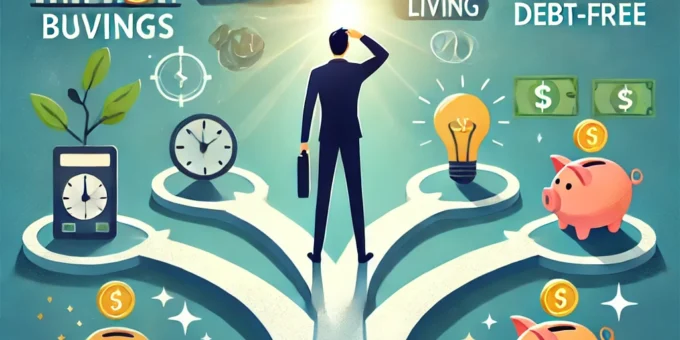
Money plays a crucial role in shaping the quality of our lives. The way we manage our finances impacts our stress levels, opportunities, and long-term security. Making smart personal finance choices isn’t just about saving money—it’s about creating a lifestyle that aligns with your goals and aspirations. With strategic planning, disciplined budgeting, and wise investments, you can achieve financial independence and peace of mind.
Understanding the Power of Financial Planning
Financial planning is the foundation of smart money management. It helps you gain control over your income, expenses, and future goals. By setting clear financial objectives, you can avoid unnecessary stress and make informed decisions that align with your long-term vision.
Assess Your Current Financial Health
Before making any changes, evaluate your financial situation. Track your income, expenses, savings, and debts. This will give you a clear picture of where you stand and highlight areas that need improvement.
Set Short-Term and Long-Term Goals
Financial success starts with setting realistic goals. Short-term goals may include saving for a vacation or paying off credit card debt, while long-term goals might involve buying a home, starting a business, or planning for retirement.
Building a Budget That Works for You
Budgeting is a powerful tool for managing finances effectively. A well-structured budget ensures that you live within your means while also setting aside money for savings and investments.
The 50/30/20 Rule
One of the most effective budgeting methods is the 50/30/20 rule:
- 50% for necessities (rent, groceries, utilities)
- 30% for wants (entertainment, dining out, hobbies)
- 20% for savings and debt repayment
Tracking Your Spending
Using apps or spreadsheets to track expenses can prevent overspending and help you identify unnecessary expenditures. Small savings from daily habits can significantly impact long-term financial health.
Eliminating Debt and Managing Credit Wisely
Debt can be a major financial burden, but with the right strategy, you can eliminate it and regain financial control.
The Snowball vs. Avalanche Method
Two popular debt repayment strategies include:
- Snowball Method – Pay off the smallest debts first for quick wins, then move to larger debts.
- Avalanche Method – Focus on paying off high-interest debts first to reduce long-term costs.
Improving Your Credit Score
A good credit score is essential for securing loans, getting better interest rates, and even renting an apartment. Pay bills on time, keep credit card balances low, and avoid unnecessary credit inquiries.
Saving for Emergencies and Future Investments
Life is unpredictable, and financial emergencies can arise at any moment. Having an emergency fund ensures you are prepared for unexpected expenses without falling into debt.
How Much Should You Save?
Financial experts recommend saving at least three to six months’ worth of living expenses in an easily accessible account.
Smart Investment Choices
Once you have a solid savings foundation, consider investing in stocks, bonds, real estate, or retirement accounts like a 401(k) or IRA. Investing allows your money to grow and helps secure your financial future.
Creating Multiple Streams of Income
Relying on a single income source can be risky. Exploring additional income streams can provide financial stability and faster wealth accumulation.
Side Hustles and Passive Income
Some effective ways to earn extra income include:
- Freelancing or consulting in your area of expertise
- Investing in rental properties or dividend stocks
- Starting an online business
- Monetizing a hobby or skill
Developing Financial Discipline and Mindset
Smart financial choices require a disciplined mindset. It’s not just about earning more—it’s about managing what you have wisely.
Avoiding Impulse Purchases
Impulse buying can derail your financial plans. Before making a purchase, ask yourself: “Do I really need this?” Waiting 24 hours before buying non-essential items can help reduce unnecessary spending.
Continuous Financial Education
Stay informed about financial trends, investment opportunities, and money management strategies. Read finance books, follow experts, and take online courses to expand your knowledge.
FAQs
How can I start improving my personal finances today?
Start by tracking your income and expenses, setting a budget, and defining clear financial goals. Small, consistent changes make a big impact over time.
What is the best way to get out of debt?
Prioritize high-interest debts using the avalanche method or pay off smaller debts first for motivation with the snowball method. Avoid accumulating new debt.
Why is having an emergency fund important?
An emergency fund protects you from unexpected financial setbacks, such as medical bills or job loss, without relying on credit cards or loans.
How can I save money without drastically changing my lifestyle?
Cut back on unnecessary expenses like eating out frequently or subscription services you don’t use. Small changes add up over time.
What are some smart investment options for beginners?
Consider low-risk options like index funds, ETFs, or high-yield savings accounts. Consult a financial advisor if needed.
How can I increase my income while working a full-time job?
Look for side gigs, freelance opportunities, or passive income sources like investing or rental properties. Upskilling can also help you earn more in your current job.
Making smart personal finance choices can transform your life, providing security, freedom, and opportunities for the future. By developing good money habits, eliminating debt, and investing wisely, you can create a financially stable and fulfilling life.
